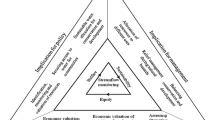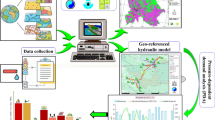Abstract
Stormwater system management in urban watersheds is often achieved by effective design and use of detention ponds which help mitigate impacts of urban drainage from water quantity and quality perspectives. The costs associated with these tasks for management can be minimized considering the fulfillment of objectives of environmental and regulatory compliance. Nonlinear and mixed integer nonlinear programming (MINLP) formulations with discrete and binary variables is developed in this study to obtain an optimal design for a multiple stormwater detention pond system. The main objective considered is the minimization of cost constrained on system performance related to pollution control. Analytical probabilistic expressions in mathematically closed form for system performance depicting watershed hydrology, control system hydraulics and pollution removal processes are integrated into the optimization formulations. Gradient-based NLP and genetic algorithm-based solvers are used to obtain optimal solutions. Application of the methodology is demonstrated with a hypothetical case study system with realistic hydrologic and water quality parameter values and the benefits of solutions for effective pollution control are reported. Results from the solutions of the formulations provide optimal design parameters considering the runoff control and pollutant reduction considering environmental and regulatory constraints. A comparison of results from these formulations to those from a dynamic programming (DP) formulation developed in an earlier study indicates that limitations associated with discretization within DP can be overcome with the proposed optimal formulations.

Similar content being viewed by others
References
Adams BJ, Papa F (2000) Urban stormwater management planning with analytical probabilistic models. Wiley, New York
Behera PK, Papa F, Adams BJ (1999) Optimization of regional stormwater management systems. J Water Resour Plan Manag ASCE 125(2):117–114
Behera PK, Li JY, Adams BJ (2006) Runoff quality analysis of urban catchments with analytical probabilistic models. J Water Resour Plan Manag ASCE 125(2):8–14
Drescher SR, Sanger DM, Davis DC (2011) Stormwater ponds and water quality: potential for impacts on natural receiving water bodies, Stormwater. 12(8)
Floudas CA (1995) Nonlinear and mixed-integer optimization: fundamentals and applications. Oxford University Press, New York
Goldberg DE (1989) Genetic algorithms in search, optimization and machine learning. Addison-Wesley, Reading
Harrell L, Ranjithan S (2003) Detention pond design and land use planning for watershed management. J Water Resour Plan Manag ASCE 129(2):98–106
Heaney JP, Huber WC, Nix SJ (1976) Storm water management model: level I-preliminary screening procedures, EPA-600/2-76-275. U.S. EPA, Cincinnati
Hirschman D, Woodworth L, Dresher S (2009) Technical report: stormwater BMPs in Virginia’s james river basin: an assessment of field conditions and programs. Center for Watershed Protection, Ellicott City
Holland JH (1975) Adaptation in natural and artificial systems. University of Michigan Press, Ann Arbor
Huber, WC, Dickinson RE (1988) Stormwater Management Model, Version 4: User’s Manual, US EPA, Washington, D.C
Nix SJ, Heaney JP, Huber WC (1983) Analysis of Storage-Release Systems in Urban Stormwater Quality Management: A Methodology. Proceedings of International Symposium on Urban Hydrology, Hydraulics and Sediment Control, Lexington, Kentucky, 19–29
Nix SJ, Heaney JP (1988) Optimization of storm water storage-release strategies. Water Resour Res 24(11):1831–1838
Papa F, Adams BJ (1997) Application of derived probability and dynamic programming techniques to planning regional stormwater management systems. Water Sci Technol 36(5):227–234
Papa F, Adams BJ, Bryant GJ (1997). Models for water quality by stormwater ponds. Advances in modeling the managements of stormwater impacts, W. James, ed., CHI, Guelph, Ontario, Canada, 5, 1–22.
Randall CW, Grizzard TJ, Helsel DR, Griffin DM (1982). Comparison of pollutant mass loads in precipitation and runoff in urban areas. Proceedings, Urban Stormwater Quality, Management and Planning, B. C. Yen, (Ed.), Water Resources Publication, Littleon, CO, 29–38.
Schueler, T (2009) Developing terrain specific design guidance for the Chesapeake Bay Watershed. Chesapeake Stormwater Network Technical Bulletin No.2, Stormwater design in the Coastal Plain of the Chesapeake Bay Watershed, Version 1.0.
Segarra-Garcia R, Basha-Rivera ME (1996) Optimal estimation of storage-release alternatives for stormwater detention systems. J Water Resour Plan Manag ASCE 22(6):428–436
Teegavarapu RSV, Simonovic SP (2000) Short-term operation model for coupled hydropower reservoirs. J Water Resour Plan Manag ASCE 126(2):98–106
Teegavarapu RSV (2013) Climate change-sensitive hydrologic design under uncertain future precipitation extremes. Water Resour Res 49:7804–7814
U.S. Environmental Protection Agency (2006) Guidance for 2006 Assessment, listing, and reporting requirements pursuant to Sections 303(d), 305(b), and 314 of the Clean Water Act, Washington, D.C.
Author information
Authors and Affiliations
Corresponding author
Rights and permissions
About this article
Cite this article
Behera, P.K., Teegavarapu, R.S.V. Optimization of a Stormwater Quality Management Pond System. Water Resour Manage 29, 1083–1095 (2015). https://doi.org/10.1007/s11269-014-0862-1
Received:
Accepted:
Published:
Issue Date:
DOI: https://doi.org/10.1007/s11269-014-0862-1




